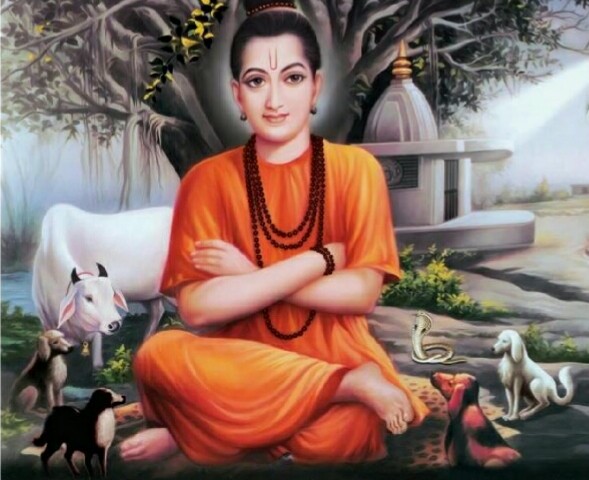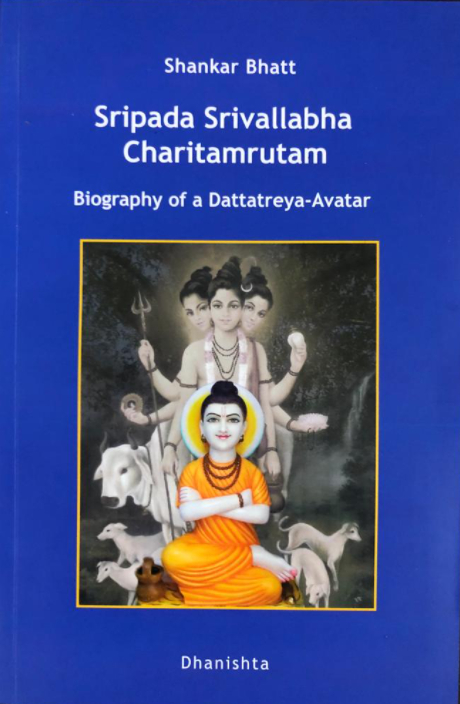
I will remain in a subtle form in every place where My biography is devotedly read. Mine is a comprehensive yogic incarnation. Great yogis and great siddhas constantly meditate upon Me. Don’t think that the Sripada Srivallabha Charitamrutam is a mere book. It is a live stream of a glorious consciousness.
Sripada Srivallabha
The ‘Sripada Srivallabha Charitamrutam‘ is an extraordinary book about the first incarnation of Lord Dattatreya in the present age. In an exciting and entertaining way, the book gives an insight into the fascinating biography of Sripada Srivallabha (1320-1350), his sportive plays, teachings, prophecies and miracles. The book provides a feeling of being in his presence and participating in the events.
As decreed by Sripada, the work was written during his lifetime but kept secret whilst he was still incarnated and for many years afterwards. He prophesised that it would come to light during the 33rd generation of his maternal grandfather. Indeed, the prophecy came true; the book resurfaced in 2001, was published in Telugu and has now been translated into several languages, including German, as had also been predicted.
The hagiography was written by Shankar Bhatt, a contemporary and devotee of Sripada Srivallabha. He was a first-hand witness to how, full of love and affection Sripada consulted, consoled, and healed devotees. Bhatt worked on the biography with a tremendous memory of names and details of events. He wrote the Charitamrutam in Sanskrit on Bhurja Patra, the bark leaves of the Indian paper birch tree.

While introducing the topic of the book, Shankar Bhatt presents himself as coming from Karnataka, a state in southwestern India. He calls himself an ignorant and illiterate person, and humbly submits the entire work as an expression of Sripada’s divine will and blessing. Nevertheless, he is the author of a stupendous multifaceted work of profound spirituality, well-designed and well-written. Throughout the book, he maintains the stance of a reporter who endeavours to objectively describe what he witnesses and hears. He tries not to judge but to record events and encounters. He records his own experiences as well as the descriptions and teachings he hears from others. He is not writing from the perspective of an uninvolved observer, but instead allows us to participate in his inner processes — his questions and doubts, his crises and tribulations, his awe and astonishment.
Bhatt was already on a pilgrimage before he began writing the book. From his remarks, we can infer that he had already walked at least one thousand kilometres following a hint from Sri Krishna to see the deity of Sri Kanyaka Parameswari in a temple at the southernmost point of India. There, he receives a call from Sri Kanyaka Parameswari to visit her ‘brother’ Sripada Srivallabha in Kuruvapuram. The village is located on an island in the Krishna River at a distance of about 1,200 kilometres. Even though Shankar Bhatt had never heard of Sripada before, without any hesitation, he immediately started his epic journey totalling several thousand kilometres. It was the year 1336 — Sripada had just left His birthplace in Pithikapuram and was at that time on a tour to Kashi (Benares) and the Himalayas by ‘yogic travelling’.
Shankar Bhatt travels by foot and sometimes by bullock carts or horse chariots — without luggage and money, not knowing how to reach the destination. He was living on alms and hospitality, sleeping at the places he came along, and experiencing hunger and life-threatening situations. Walking alone or with co-travellers, he meets saints, frauds and robbers, farmers and merchants, kings, housewives and prostitutes. He encounters orthodox arrogance, sectarianism, lies, disputes and even complots against Sripada, which the latter dissolves in surprising ways.
Shankar Bhatt is a Brahmin, but his experiences teach him) to overcome the barriers of caste and creed and to feel the unity of all striving toward the divine. He undergoes deep transformations and is carried forward on his initiatory journey by a fiery aspiration which is strengthened by his encounters with sublime siddhas and yogis. He interrogates them about profound spiritual topics and above all about their experiences with the divine incarnation of Sripada Srivallabha. Often, they knew beforehand through messages from Sripada or from clairvoyant perceptions that Shankar Bhatt would be coming, and they willingly share with him fantastic stories about Sripada’s effulgent presence and his miraculous playful pastimes. He receives insights into previous incarnations of people reaching far back in time, and learns about Sripada’s prophetic announcements of His own future incarnations as Narasimha Saraswati (1378 – 1459) and Swami Samartha (? – 1878). The book foretells about the advent of Shirdi Sai Baba. Sripada instructs Hanuman to incarnate as Baba. There are also many hints about future events, some of which already belong to the past.
The book is full of unimaginable events, revelations and wonders like cases of souls simultaneously incarnating in different bodies or numerous cases of bringing deceased persons back to life.
But the indisputable highlight is Shankar Bhatt’s personal encounter with Sripada, the goal of his search. However, the story does not end there. Shankar Bhatt continues) his journey to other places that Sripada sends him. Shankar Bhatt meets Sripada’s family and friends and collects more astounding stories.
He finally comes to live with Sripada at Kuruvapuram. There, he looks after the numerous devotees coming to take the Guru’s wisdom teachings; he also takes care of cooking and cleaning. When the food is not enough for all the visitors, Sripada sprinkles some water on it, and it becomes inexhaustible.
After the final disappearance of Sripada, Shankar Bhatt continued to live in Kuruvapuram for three more years, concluding the text with Sripada appearing to him every night at midnight. After finishing the Charitamrutam, he read the book with five people. He knew from Sripada that it wouldn’t be published immediately; after a Telugu version was created, his Sanskrit version would vanish and would be transported to a subterranean location under the birthplace of Sripada. The Telugu version would come to light in the 33rd generation of the family of Sripada’s maternal grandfather after a certain sign for this was given. Then the book would be published, and it would be translated into many languages. Sripada’s name would start spreading all over the world, and millions of people would be attracted to His Samsthan, the temple at the birthplace of Sripada.
The sign for the reappearance of the book was given in 1999 to Malladi Govinda Deekshitulu, a member of the 33rd generation of the family of Sripada’s maternal grandfather. He copied the Telugu text from the old manuscript. Then he immersed the old copy in the Krishna River at Vijayawada as prophesied, and brought a copy to the Samsthan for the publication of the book.
In some places, the book is not an easy read, especially for Westerners. One encounters numerous names of persons and deities, along with unfamiliar concepts and expressions. Even though, in some parts, the book can be challenging, nevertheless it does impact the consciousness of the reader. It is nourishing, charming, joyful and catalyses spiritual unfoldment.
The best way to read the book is with an open mind and heart, not trying to understand everything upon the first reading.
Jai Sripada Srivallabha, Jai Gurudeva Datta.
It is my vow to protect people who have surrendered to me.
– Chapter V
In order to obtain the grace of Shripad Shrivallabha, our ego should disappear completely. When your hearts are free from the six enemies like desire, anger, greed, hatred, lust and pride and becomes pure, then Swami’s grace is obtained without delay.
– Chapter II
Shri Datta Prabhu is beyond time and space. In the presence of Datta Prabhu, we do not perceive the past, present and future differently. Everything is in the present only.
– Chapter III
Shripad Shrivallabha is Dattaguru himself. He has taken incarnation in this Kaliyuga. Presently he is Kuravpur itself. His grace depends upon our level of devotion. If you remember Shripad Shrivallabha as a Sadhguru, you will get experiences as a Sadhguru only. If you remember him as Paramatma, he proves that he himself is the Paramatma. You too remember the name of Shripad Shrivallabha. You will realise what your right duty is. Everybody will get favourable results.
– Chapter V
Sripada Srivallabha Charitamrutam – Biography of a Dattatreya Avatar by Shankar Bhatt, 2nd Edition, 2020, Dhanishtha Foundation, Visakhapatnam, India.
For copies: #15-7-1, Angels Enclave, Krishna Nagar, Visakhapatnam – 530 002, Andhra Pradesh, India, Tel. +91 891 2701531
www.worldteachertrust.org
© MyDattatreya 2021 All rights reserved
Designed by Tamara Lj.